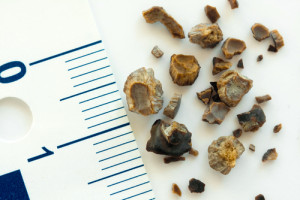General Stone Prevention
 Urinary stones are a common problem in the western world affecting close to 10% of people at some point in their lives.
Urinary stones are a common problem in the western world affecting close to 10% of people at some point in their lives.
Stones are most commonly made of a combination of calcium, phosphate and oxalate but can also include other minerals such as uric acid. The interaction between these minerals in the urine is complex.
If a person has formed a stone, there is roughly a 50% chance that they may form another within the next 10 years. People who are overweight, have diabetes or high blood pressure are more likely to form stones.
An evaluation of your urine and blood can sometimes identify a single reason for the stone formation but often no direct cause is found. In this case the general lifestyle and dietary advice below can broadly address a number of factors that commonly cause stones
- Increase fluids
- Having an adequate volume of urine each day prevents the precipitation of minerals that cause stones, and washes out any microscopic minerals that may form before they become a problem.
- Aim for fluid intake between 2 and 2.5 litres. This may need to be increased if you are active or out in the sun. As a general rule – if you are thirsty you need more liquid!
- Water is ideal. The most important thing however is to reach the volume targets so if you absolutely can’t stand water, other beverages are better than nothing.
- Dark colas and grapefruit juice have been shown to increase stone risk. Light citrus colas (sprite, 7-up) are better, as they may contain some citrate, which is protective (we will get to that)
- Restrict your salt intake
- Salt intake is linked to calcium excretion in the urine. The average western diet is unfortunately extremely high in salt.
- Avoid foods which are clearly salty and resist the urge to add additional salt to anything.
- Guidelines suggest less than 2,300mg a day (which can be hard to achieve) but any reduction will help so start slowly and set achievable targets.
- Increase dietary citrate
- Citrate is a factor in your urine which is protective against stones
- Available in citrus fruit as well as melons and tomato
- 120ml of lemon juice a day (mixed with water, or straight if you are brave!) is a simple way to achieve this.
- Moderate calcium diet
- Even if you are forming calcium stones, cutting calcium out of your diet may be harmful as it increases the risk of forming stones from other competing minerals (oxalate)
- 3-4 servings a day is recommended.
- A serving is roughly 1 glass (250ml) of milk, 1 tub (200g) of yogurt or two slices (40g) of cheese.
- Avoid taking dietary calcium supplements as these probably have more calcium than you need, which your body will then try to excrete in your urine. Some people may need calcium supplements for medical reasons (bone health etc) and these should be continued if indicated
- Moderate animal protein intake
- Animal protein breaks down into purines that form uric acid in the body. Uric acid can cause uric acid OR calcium stones.
- An adequate animal protein intake is 1g/kg/day. An easier way to calculate this is to aim for a portion the size of your fist, or a pack of cards.
- All animal protein (red meat, fish, poultry) is roughly equal in this regard.
 If there was an abnormality found in the screening of your blood or urine, other measures may be appropriate for you. These can include further dietary modification or even medical therapy.
If there was an abnormality found in the screening of your blood or urine, other measures may be appropriate for you. These can include further dietary modification or even medical therapy.
The latest AUA guidelines (American Urological Association) are available online if you would like any more detail about the evidence for these recommendations. They are quite comprehensive (although also quite complicated!).
https://www.auanet.org/education/guidelines/management-kidney-stones.cfm#20
Download this information to print here
 Urinary stones are a common problem in the western world affecting close to 10% of people at some point in their lives.
Urinary stones are a common problem in the western world affecting close to 10% of people at some point in their lives.  If there was an abnormality found in the screening of your blood or urine, other measures may be appropriate for you. These can include further dietary modification or even medical therapy.
If there was an abnormality found in the screening of your blood or urine, other measures may be appropriate for you. These can include further dietary modification or even medical therapy.